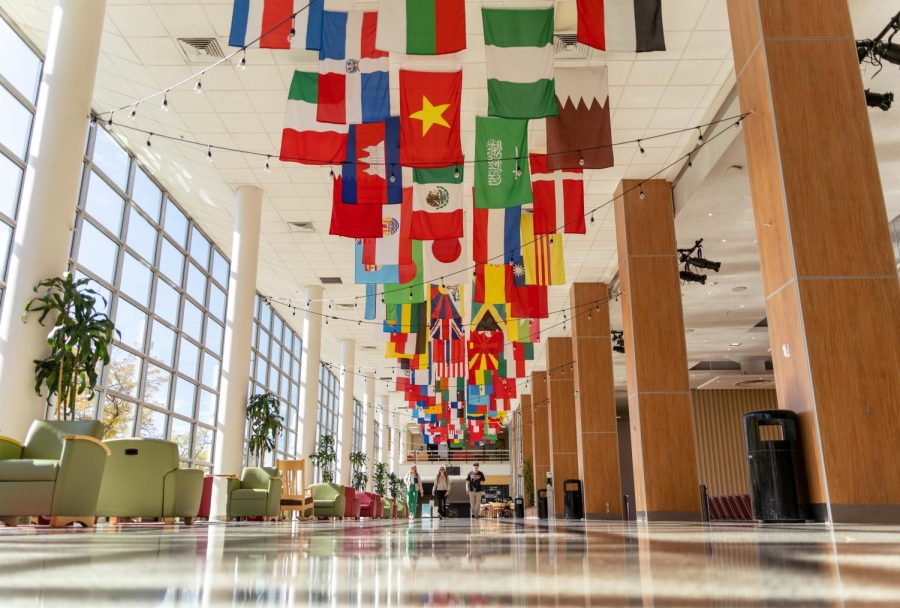U Introduces World Languages & Cultures Major
National flags in the A. Ray Olpin Union building on campus at the University of Utah in Salt Lake City, Utah, on Oct. 28, 2021. (Photo by Xiangyao “Axe” Tang | The Daily Utah Chronicle)
September 27, 2022
The University of Utah launched a new major this fall titled the “world languages & cultures B.A.”
The degree has seven total emphasis tracks and allows students to major in either comparative literature or cultural studies, as well as five new languages that were previously unavailable as majors. These languages are Arabic, Italian, Korean, Persian and Portuguese.
“The new major kind of came out of a restructuring of our old comparative literature major, which we thought needed some updating,” said Christopher Lewis, chair of the department of World Languages & Cultures.
Lewis said the reason for this update is that the original major was difficult for most students to complete in four years.
“If they’re starting from zero in two or more languages, that can be really hard to do to reach the advantage level of that many languages by the time you graduate and take the courses that are needed,” he said. “It’s something we wanted to fix so that those students still had options.”
This dilemma is how the cultural studies track of the new major came to fruition. This track allows students to study non-English speaking cultures, countries and traditions without having to become fluent in the language they are studying.
“The cultural studies track doesn’t require any advanced language classes,” Lewis said. “You have to do the regular B.A. language requirement that all B.A.’s require but you can take your upper-division courses all in English. You can think of it as World Literature or World Cultural Studies.”
Lewis said another area of motivation for introducing the new major is the underutilization of certain languages within the department.
“We also wanted to take advantage of many of the languages that we offer that we didn’t currently offer a major in,” Lewis said. “In order to offer a major you’ve got to staff these classes to go all the way from beginning classes to advanced classes. But because our department houses all the languages of the university, we’re able to pool faculty resources at some of the lower intro classes.”
This pooling of resources through the major allows the department to avoid duplicating staff at the lower level and keep the advanced classes staffed for each individual language.
Though the five languages were already housed in the World Languages & Cultures department as minors, Lewis said there was a demand from students to create majors for a while.
“There’s this core of students that I consistently hear from year to year: ‘when is there gonna be a major?’” Lewis said.
Travis Martinez, fourth-year biochemistry and world languages & cultures major, has an emphasis in Portuguese.
“I’ve been working on a Portuguese minor for the last year and I’ve also been a recipient of the FLAS scholarship,” he said.
The Foreign Language and Area Studies scholarship is awarded to students studying a foreign language or region they are interested in, and for Martinez, that was Portuguese.
“That actually takes me above what I need for the minor,” he said. “So I’ve already achieved the minor but I’m still going with this FLAS scholarship because I love studying Portuguese.”
His work on the minor as well as for the FLAS Scholarship ended up benefitting him when he heard about the new degree and learned he had already completed most of the course requirements to complete a major in Portuguese.
“All I have to do is add these three extra classes and I am now getting this major, which is really awesome,” he said.
In addition to the new cultural studies track and the five languages, the new major contains a comparative literature emphasis that is similar to the original major.
“That’s for students that want to study more than one language at the advanced level,” Lewis said. “You can do it with two languages or three.”
When the new major was announced, Lewis said that track sparked a lot of interest among students, despite the fact that a similar degree had existed prior.
“That degree had been put on hold while we restructured it and maybe there was just a lack of awareness that it existed,” Lewis said. “They were suddenly very interested.”
Lewis added the students involved with this emphasis often study and compare two completely unrelated languages.
“People will say, ‘I want to do Arabic and Portuguese,’” he said. “I don’t know if counterintuitive is the right word but you would expect people to do languages that are more related because that’s easier, but no, they want to do completely different things and that’s exciting.”
Erin Hardy, a first-year Russian and world languages & cultures major, chose the comparative literature track, studying French and Persian.
“I was originally majoring in French and Russian, but I wanted to start studying Persian as well,” she said. “I’m really interested in the former Soviet countries of Central Asia and there are a few where Persian is one of the languages spoken, so I just wanted to start learning more about that region, but I thought I had too many interests to be able to do them all.”
The new major turned out to be a way for Hardy to combine those interests.
“I spoke with my counselors; they know how much I love languages and I always am coming to them and asking if I can take more,” she said. “They told me about the major and it was really the perfect option.”
Lewis believes the major will greatly benefit any student who does it, no matter what field they go into after graduation.
“No matter which track people do, all of these tracks involve a lot of comparative analysis across diverse cultures, across diverse traditions,” he said. “What people don’t understand sometimes is how essential language and learning languages and cultures will be to their careers, even if they think they’re not going to be working in that specifically.”








